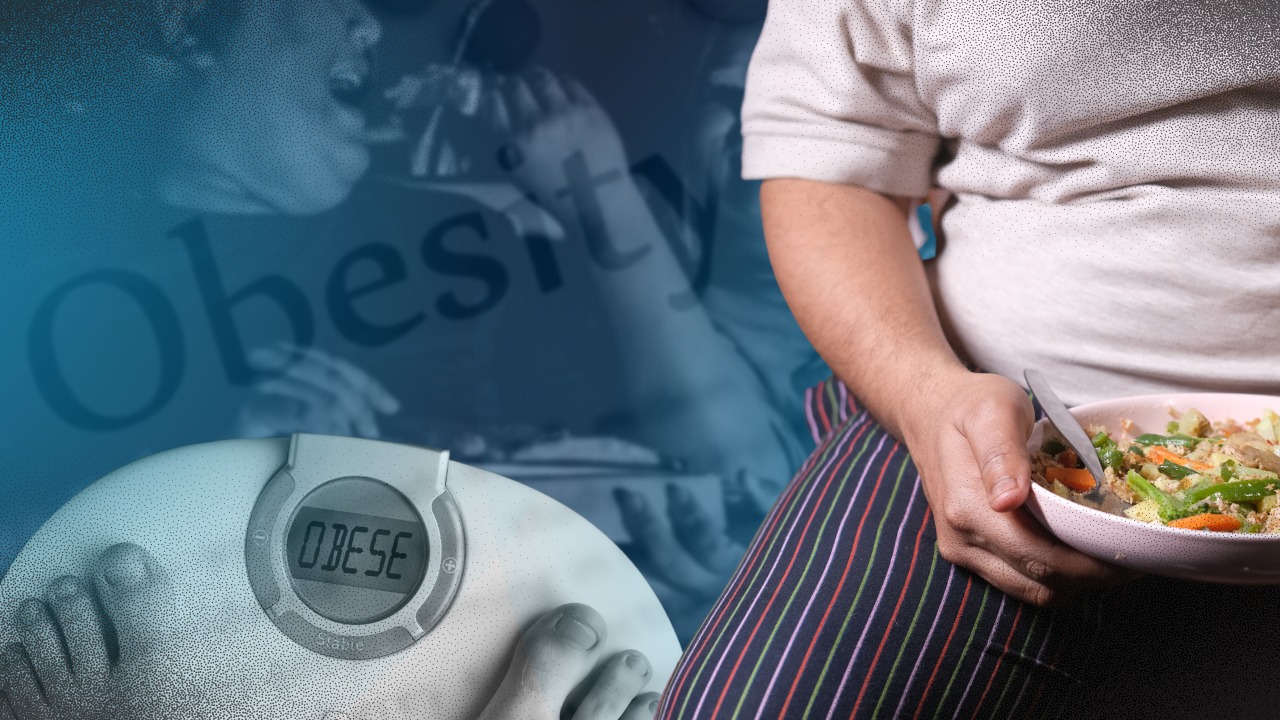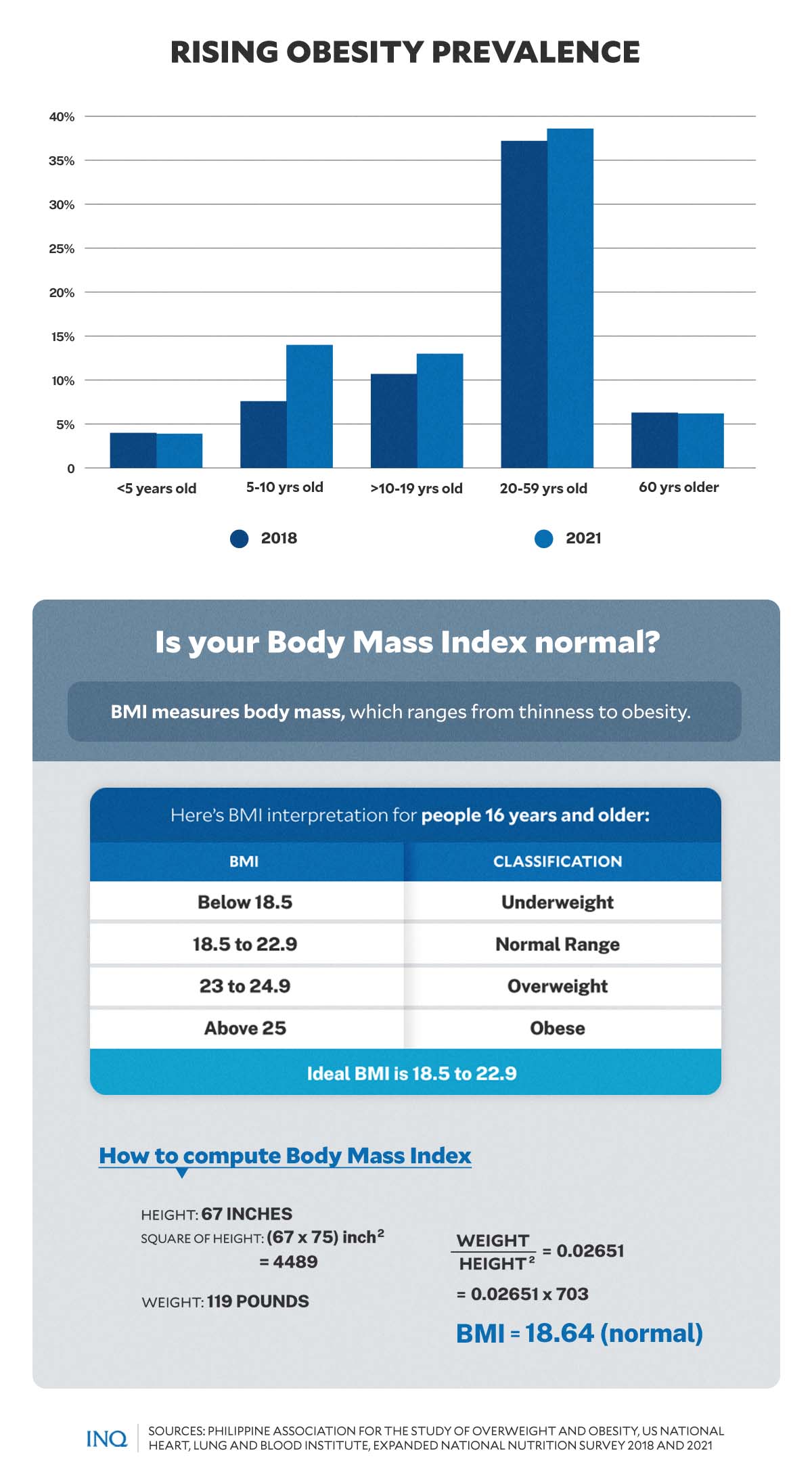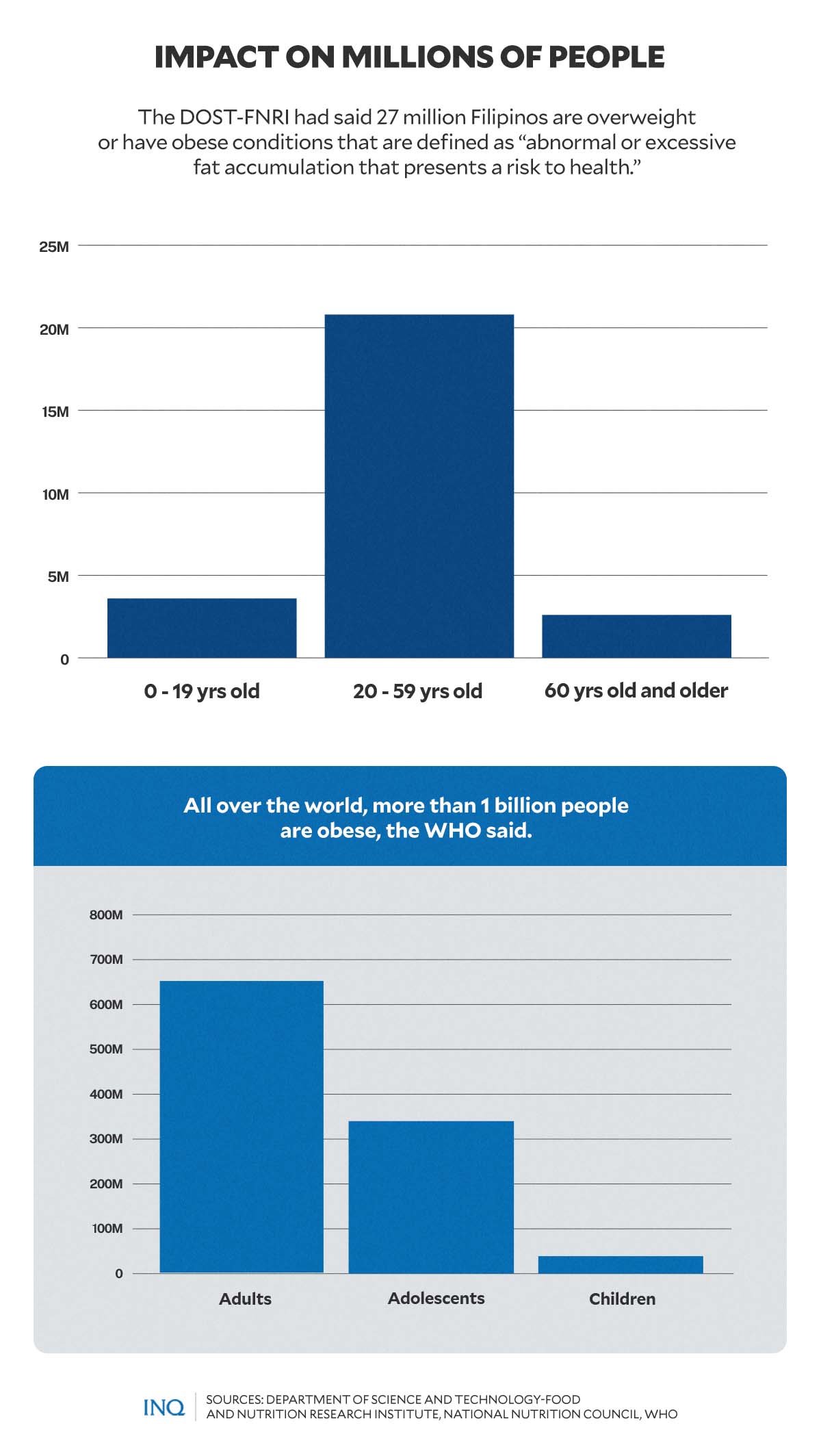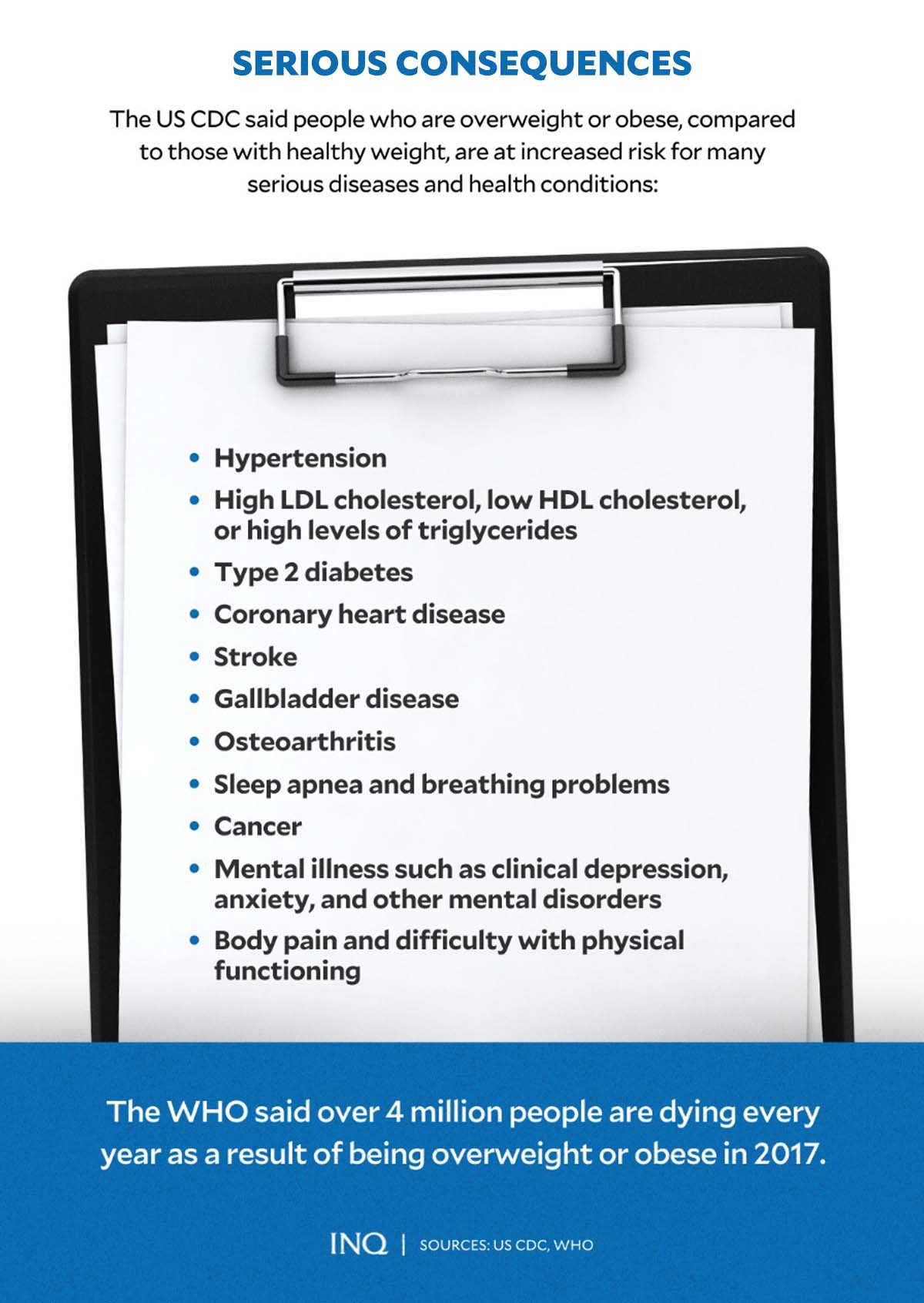Obesity’s heavy toll: Millions of Filipinos now at greater health risks
MANILA, Philippines—The past two years have been almost at a standstill because of the COVID-19 crisis, but while its economic consequences were evident, most people have not heard of how a “silent epidemic” took its toll on millions of Filipinos.
Last Monday (Nov. 14), the Department of Science and Technology-Food and Nutrition Research Institute (DOST-FNRI) said it saw an increase in the prevalence of obesity, especially among children and adults.
This, as result of the 2021 Expanded National Nutrition Survey (ENNS) showed that 14 percent of children 5 to 10 years old, 13 percent of individuals 10 to 19 years old, and 38.6 percent of adults 20 to 59 years and older were obese.
The rates were higher compared to the prevalence of obesity in 2018, where incidence related to the “complex condition that involves an excessive amount of body fat” was only 7.6 percent, 10.7 percent, and 37.2 percent, respectively.
READ: More Filipinos got obese during pandemic – survey
Article continues after this advertisementWhen it comes to children younger than 5 years old and the elderly, or those 60 years and older, the prevalence of obesity was 3.9 percent and 6.2 percent, slightly lower than 4 percent and 6.3 percent in 2018.
Article continues after this advertisementAs stressed by the DOST-FNRI, because of the high incidence of obesity, the Philippines missed its target of “no increase or reduced obesity prevalence” that was stated in the Philippine Plan for Action 2017 to 2022.
But how did this happen?
Health Undersecretary Maria Rosario Vergeire, officer-in-charge of the Department of Health (DOH), said the main reasons for the increase were physical inactivity because of the lockdowns and the kind of food that people were consuming in the past two years.
“We were all on lockdown, we didn’t have the chance to go out and exercise,” she said.
Likewise, she explained that people had more online orders for food, saying that it became more convenient for families, especially those who lacked time to prepare food, but she said “we cannot really oversee and regulate the contents of these foods.”
Vergeire said especially children, since they were not allowed to go out, will order snack. “Even in the early hours of the morning, fast food. So these are all contributory to this increase in obesity,” she said.
How one becomes obese
As defined by the World Health Organization (WHO), overweight and obesity are conditions involving “abnormal or excessive fat accumulation that presents a risk to health.”
The UK National Health Service (NHS) explained that obesity, which affects one billion people all over the world—650 million adults, 340 million teens, 39 million children—is generally caused by eating too much and moving too little.
It explained that “if you consume high amounts of energy, particularly fat and sugars, but do not burn off the energy through exercise and physical activity, much of the surplus energy will be stored by the body as fat.”
The NHS, however, stressed that obesity does not happen overnight, saying that “it develops gradually over time, as a result of poor diet and lifestyle choices such as eating large amounts of processed food or fast food.
Drinking too much alcohol, eating out a lot, eating more than what you need, drinking too many sweets, and comfort eating are likewise considered reasons why one becomes overweight or obese.
RELATED STORY: There’s more to obesity than meets the eye
“Lack of physical activity is another important factor related to obesity. Many people have jobs that involve sitting at a desk for most of the day. They also rely on their cars, rather than walking or cycling.”
“If you’re not active enough, you do not use the energy provided by the food you eat, and the extra energy you consume is stored by the body as fat,” it said, stressing that many people tend to watch TV or browse the internet for relaxation but rarely exercise.
As stressed by the Philippine Association for the Study of Overweight and Obesity (PASOO), “you have a better chance of living a long and healthy life if your BMI is between 18.5 and 22.9.”
Body Mass Index (BMI), as defined by the US National Heart, Lung and Blood Institute, provides a measure of body fat, which ranges from thinness to obesity. Here’s the BMI interpretation for people 16 years and older:
- Below 18.5: Underweight
- 18.5 to 22.9: Normal Range
- 23 to 24.9: Overweight
- Above 25: Obese
Everyone needs to act
The DOST-FNRI said 27 million Filipinos are overweight or obese, with the National Nutrition Council (NNC) saying in a radio interview that 3.6 million are 0 to 19 year olds, 20.8 million are 20 to 59 year olds, while 2.6 million are those 60 years and older.
The DOH had said in the past two decades, overweight and obesity among adults grew from 20.2 percent in 1998 to over 30 percent in 2018, when an ENNS was conducted.
As stressed by the United Nations Children’s Fund (Unicef), “if no action is taken, overall rates of overweight and obesity will continue to rise” and that “it is projected that more than 30 percent of Filipino adolescents will be overweight and obese by 2030.”
“Obesity, which was once considered a problem primarily in high-income and developed countries, is now a rising health problem in low- and middle- income countries including the Philippines.”
It said the National Policy on Addressing Overweight and Obesity is already being developed in the Philippines “to provide directions and guidance to all stakeholders to curb obesity using population-based approaches.”
These approaches are for prevention, regulatory mechanisms to influence the food environment, management of existing cases and research and surveillance, Unicef said last March.
To strategically address the growing problem of obesity in the Philippines, the DOH, NNC, and national partners, like the PASOO and Nutrition Center of the Philippines, recommend the following actions to be taken:
- Implement policies, legislation, and interventions to promote physical activity including active transport and promotion of green, blue, and open spaces in communities and workplaces
- Strengthen and sustain appropriate social and behavior change communication on healthy diet and physical activity
- Implement a package of policies and interventions to promote, protect, and support infant and young child nutrition, especially in the first 1000 days of life to prevent stunting and reduce risk for children to become obese in their later lives
- Develop a strategy with corresponding funds, human resources, and accountability mechanisms, including empowering the health system with dedicated programs on obesity across the life stage
- Improve data, monitoring, and enforcement of laws and introduce new legislation on marketing and labeling of food products
- Provide subsidies to farmers and fisherfolk and increase access to nutritious food
- Use social protection programs such as the Pantawid Pamilyang Pilipino Program to improve access to healthy food, especially in times of disasters
- Promote healthy school food environments for children
READ: A public health concern
This, as the DOH said the Philippines needs interventions that address the social determinants of health, highlighting the need to integrate health in all public policies to enable behavior change and create supportive environments.
Serious consequences
But why do you need to care?
As explained by the US Centers for Disease Control and Prevention (CDC), people who are overweight or obese, compared to those with healthy weight, are at increased risk for many serious diseases and health conditions such as these:
- Hypertension
- High LDL cholesterol, low HDL cholesterol, or high levels of triglycerides
- Type 2 diabetes
- Coronary heart disease
- Stroke
- Gallbladder disease
- Osteoarthritis
- Sleep apnea and breathing problems
- Cancer
- Mental illness such as clinical depression, anxiety, and other mental disorders
- Body pain and difficulty with physical functioning
This, as the WHO said obesity is a disease impacting most body systems, like the heart, liver, kidneys, and even the reproductive system. People with obesity are also three times more likely to be hospitalized for COVID-19.
“The issue has grown to epidemic proportions, with over 4 million people dying each year as a result of being overweight or obese in 2017 according to the global burden of disease,” it said.
As stressed by the Harvard School of Public Health, excess weight, especially obesity, diminishes almost every aspect of health, from reproductive and respiratory function to memory and mood.
“It does this through a variety of pathways, some as straightforward as the mechanical stress of carrying extra pounds and some involving complex changes in hormones and metabolism,” it said.
“Obesity decreases the quality and length of life, and increases individual, national, and global healthcare costs.”
RELATED STORY: Obesity a driving factor in COVID-19 deaths, global report finds
TSB
For more news about the novel coronavirus click here.
What you need to know about Coronavirus.
For more information on COVID-19, call the DOH Hotline: (02) 86517800 local 1149/1150.
The Inquirer Foundation supports our healthcare frontliners and is still accepting cash donations to be deposited at Banco de Oro (BDO) current account #007960018860 or donate through PayMaya using this link.



